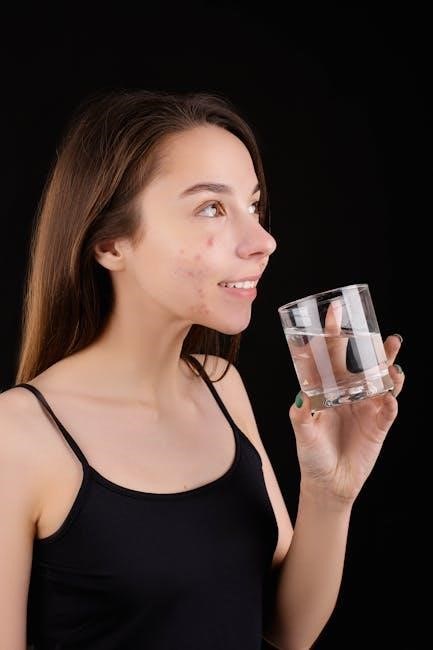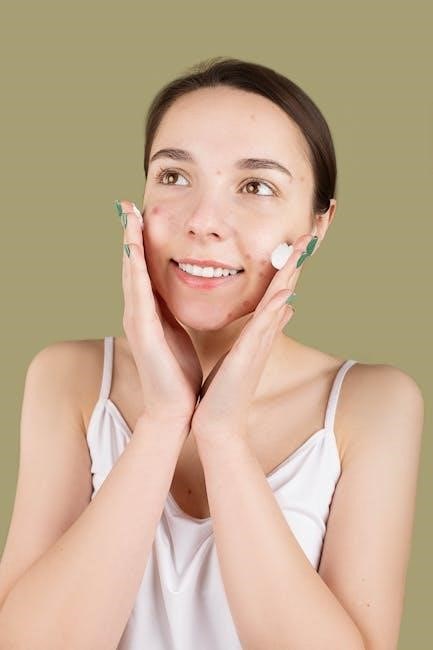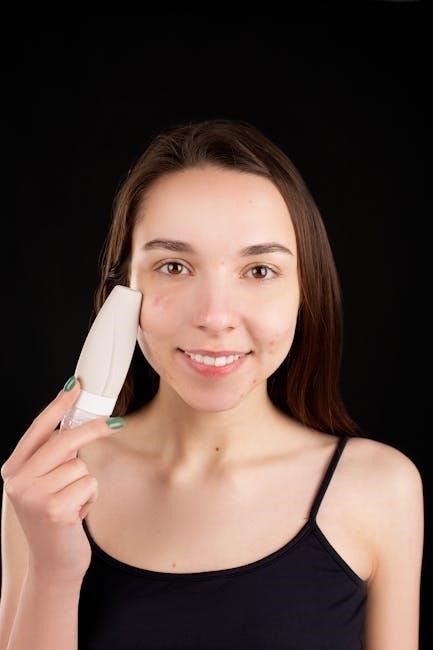Puberty is a natural biological process marking the transition from childhood to adolescence․ It involves physical, emotional, and hormonal changes, preparing the body for adulthood․ Each girl’s journey is unique, but understanding these changes can foster confidence and resilience․ Dr․ Jasmine Reese emphasizes that while the timing varies, these transformations are a normal part of growth․
1․1 What is Puberty?
Puberty is a natural biological process where a girl’s body transitions from childhood to adolescence, preparing for adulthood․ It involves physical, hormonal, and emotional changes, such as breast development, growth spurts, and the onset of menstruation․ Each girl’s experience is unique, but these changes are a normal and essential part of maturation․
1․2 The Tanner Stages of Puberty
Puberty is divided into five Tanner stages, developed by Professor James M․ Tanner․ These stages track physical development, starting with pre-puberty (Stage 1) and ending with full maturity (Stage 5)․ Each stage includes specific changes, such as breast budding, pubic hair growth, and height increases, guiding girls through their unique growth journey smoothly and systematically․
Physical Changes During Puberty
Puberty brings significant physical changes, including breast development, growth spurts, and body shape alterations․ Girls experience hair growth in new areas and eventually start menstruating, marking their transition to womanhood․
2․1 Breast Development
Breast development is often the first visible sign of puberty in girls․ It begins with small breast buds under the nipple, which may feel tender or itchy․ The areola darkens and enlarges, and over time, the breasts grow fuller and more rounded, eventually reaching their adult shape and size․
2․2 Growth Spurts and Body Shape Changes
During puberty, girls experience significant growth spurts, with the body growing taller at a rate of about 3․2 inches per year․ Hips and thighs accumulate fat, leading to a curvier silhouette․ This transformation varies in timing and pace but is a natural part of developing into a adult body shape․
2․3 Pubic and Underarm Hair Growth
Puberty brings the growth of soft, light pubic hair near the vulva, which gradually becomes coarser and darker․ Underarm hair appears later, typically after puberty progresses․ These changes are normal and vary in timing for each girl․ Proper hygiene practices, such as regular washing, can help maintain comfort and confidence during this phase․

Emotional and Social Changes
Puberty brings emotional shifts, including mood swings, new feelings, and social challenges․ Girls may experience heightened sensitivity and self-awareness, impacting relationships with family and friends․ Open communication and support are key to navigating these changes confidently․
3․1 Understanding Mood Swings
Mood swings during puberty are common due to hormonal changes․ Girls may feel intense emotions, from excitement to sadness, often without clear triggers․ These shifts can be confusing but are a normal part of development․ Open conversations with trusted adults and friends can help girls cope and understand these emotional changes․
3․2 Building Self-Esteem and Confidence
Building self-esteem during puberty involves embracing changes and fostering a positive self-image․ Encourage girls to focus on their strengths, practice self-care, and surround themselves with supportive people․ Open conversations about body changes and emotions can help them feel confident․ Remind them that self-acceptance is a journey, and it’s okay to seek support when needed․
3․3 Navigating Relationships with Family and Friends
During puberty, hormonal changes can affect moods and relationships․ Open communication with family and friends is key to understanding and support․ Encourage girls to express their feelings and listen to others, fostering empathy․ Balancing time with peers and family helps maintain strong bonds․ Remember, relationships are a source of comfort and guidance during this transition․

Hygiene and Self-Care
Proper hygiene and self-care are essential during puberty․ Regular showers, using deodorant, and maintaining skincare routines help manage body changes․ Prioritize menstrual hygiene with pads or tampons to stay clean and confident․
4․1 Skincare and Acne Management
Hormonal changes during puberty often lead to acne․ To manage this, wash your face daily with mild soap and use over-the-counter treatments․ Removing makeup and keeping hair away from the face can help․ If acne persists, consult a dermatologist․ Regular skincare routines and healthy habits promote clearer skin and boost confidence․
4․2 Managing Body Odor
During puberty, hormonal changes can lead to stronger body odor․ To manage this, use deodorant or antiperspirant daily, shower regularly, especially after sports, and wear clean clothes․ Keeping underarms dry and practicing good hygiene helps reduce odor․ These steps can boost confidence and help you feel fresh throughout the day․
4․3 Menstrual Hygiene and Care
Proper menstrual hygiene is essential for health and confidence․ Use sanitary pads or tampons, changing them every 4-8 hours to prevent odor and infection․ Wash hands before handling products and clean the genital area with mild soap․ Dispose of used products properly and consider reusable options like menstrual cups for eco-friendly care․

Health and Wellness
Nutrition, exercise, and sleep are crucial during puberty․ Eating nutrient-rich foods supports growth, while regular physical activity and 8-10 hours of sleep ensure overall well-being and energy․
5․1 Nutrition for Growing Bodies
Nutrition is vital during puberty, supporting growth and energy․ Include protein-rich foods like lean meats, dairy, and legumes, along with calcium for bone health․ Fruits, vegetables, and whole grains provide essential vitamins and minerals․ Stay hydrated with water and limit sugary drinks․ Healthy eating habits now set the foundation for lifelong wellness and vitality․
5․2 Exercise and Physical Activity
Regular exercise is crucial during puberty, promoting physical and mental health․ Activities like sports, dancing, or cycling can improve strength, coordination, and mood․ Aim for at least 60 minutes daily to support growth, energy levels, and confidence․ Exercise also helps manage stress and fosters a positive body image, essential during this transformative phase․
5․3 Importance of Sleep
Sleep is vital during puberty, supporting growth and development․ Teens need 8-10 hours nightly to aid hormonal balance, brain function, and physical recovery․ Lack of sleep can lead to mood swings, fatigue, and difficulty concentrating․ Establishing a consistent sleep routine helps maintain overall health and well-being during this critical phase of life․

Understanding Menstrual Health
Menstrual health is crucial for understanding the biological processes and emotional aspects of a girl’s reproductive cycle․ It involves managing periods, hygiene, and recognizing normal vs․ abnormal symptoms to ensure overall well-being and confidence during this natural phase of life;
6․1 Preparing for Your First Period
Preparing for your first period is essential for confidence and comfort․ Start by understanding menstrual cycles and gathering supplies like pads or tampons․ Talk to trusted adults for support and guidance․ Knowing what to expect helps reduce anxiety, ensuring you’re ready physically and emotionally for this significant milestone in your journey through puberty․
6․2 Understanding Menstrual Cycles

A menstrual cycle averages 28 days, though it can range from 21 to 35 days․ It begins with the follicular phase, where the uterus lining thickens, and ends with menstruation if pregnancy doesn’t occur․ Ovulation, when an egg is released, typically happens around day 14․ Hormones like estrogen and progesterone regulate this process, preparing the body for potential pregnancy․
6․3 Managing Menstrual Cramps and PMS
Menstrual cramps and PMS symptoms can be challenging․ Over-the-counter pain relievers like ibuprofen can help alleviate cramps, while warm compresses or baths provide additional relief․ Staying hydrated, eating balanced meals, and engaging in light exercise may reduce discomfort․ Tracking your cycle can also help anticipate and prepare for symptoms, making them more manageable․
Seeking Support
Seeking support during puberty is crucial․ Talk openly with parents, guardians, or trusted adults about concerns or questions․ Healthcare providers can offer guidance and reassurance, while friends can provide emotional backing and understanding․
7․1 Talking to Parents or Guardians
Talking to parents or guardians is a key part of navigating puberty․ Open communication helps girls understand changes and feel supported․ Parents can offer guidance, reassurance, and practical advice, helping their child build confidence and resilience through this transformative phase․ Encouraging honest conversations fosters trust and provides a safe space to address concerns․
7․2 When to See a Healthcare Provider
Girls should consult a healthcare provider if they experience unusual symptoms, such as early or delayed puberty, severe menstrual cramps, or heavy bleeding․ Concerns about acne, body odor, or emotional struggles should also be addressed․ A healthcare provider can offer guidance, reassurance, and treatments to support physical and emotional well-being during puberty․
7․3 Building a Support Network of Friends
Building a support network of friends during puberty can help girls navigate emotional and physical changes․ Open communication and shared experiences foster trust and empathy․ Friends can offer advice, reassurance, and understanding, reducing feelings of isolation․ Encourage girls to nurture friendships by being a good listener and confidante, creating a supportive community for mutual growth․
Preparing for Adulthood
Preparing for adulthood is an empowering journey that involves setting goals, developing independence, and building confidence․ These steps lay the foundation for future success and self-reliance․
8․1 Understanding Future Goals and Aspirations
Understanding future goals and aspirations helps girls envision their path to adulthood․ Setting both short- and long-term objectives fosters purpose and direction․ Encouraging self-reflection and exploration of interests can guide them toward meaningful pursuits and personal fulfillment, preparing them to embrace their roles in society with confidence and ambition․
8․2 Developing Independence
Developing independence during puberty involves taking ownership of personal responsibilities, such as self-care and decision-making․ Girls learn to navigate daily tasks, manage emotions, and build resilience․ This phase encourages self-reliance, fostering confidence in their ability to handle life’s challenges and make informed choices, preparing them for greater autonomy in the future․
8․3 Building Self-Confidence for the Future
Building self-confidence during puberty is crucial for a girl’s future․ It involves embracing individuality, recognizing strengths, and developing a positive self-image․ Encouraging open communication and celebrating achievements helps foster resilience․ Girls learn to believe in their abilities, preparing them to approach life’s challenges with assurance and optimism․
Puberty is a transformative journey, preparing girls for adulthood․ Understanding its stages fosters confidence and resilience․ Embrace this natural process, knowing it equips you for a bright future․
9․1 Final Thoughts on Navigating Puberty
Navigating puberty is a unique journey, fostering resilience and confidence․ Embrace the physical and emotional changes, knowing they are natural and temporary․ Open communication with trusted adults and self-compassion are key․ Remember, you are not alone—every girl experiences this transformation․ Stay informed, stay positive, and celebrate your growth into a capable, confident young woman․
9․2 Encouragement for the Journey Ahead
Remember, you are strong and capable of navigating this journey․ Embrace your uniqueness and celebrate small victories․ Surround yourself with supportive friends and family, and don’t hesitate to seek guidance when needed․ Every challenge is an opportunity to grow, and your confidence will shine through as you embrace your future with courage․


